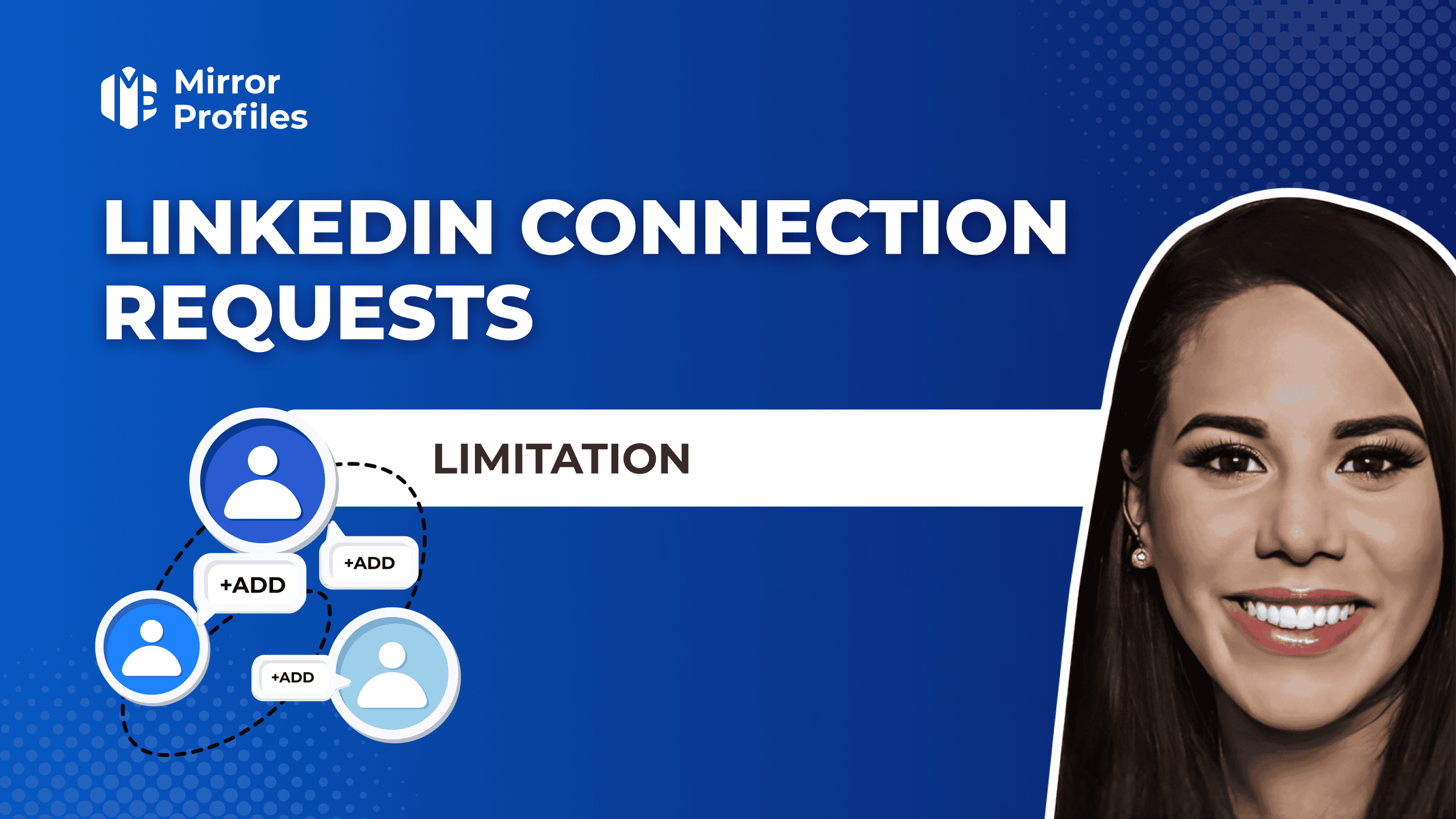Introduction
Networking is crucial for any professional wishing to broaden their horizons, make themselves known and forge strong links with colleagues, customers or partners.
It involves forging and maintaining relationships based on trust, respect and collaboration with individuals who share your interests, values or objectives.
But how can you effectively develop your network while making the process enjoyable?
How can you stand out among the many requests received by your potential contacts?
How can you avoid being perceived as too formal, too insistent or too boring?
One tried and tested solution: use humor!
Humor is an effective strategy for capturing attention, arousing interest, making connections and communicating your ideas. MirrorProfiles lets you multiply your Linkedin accounts and thus your prospecting capacity, but don’t forget the fundamentals of Linkedin: networking, whether on your personal account or on MirrorProfiles professional accounts, is based on people.
Humor can make initial exchanges easier, helping you to stand out from the crowd, gain sympathy and remain memorable.
Humor can also be useful for defusing tense situations, responding to objections and building trust.
This article will show you why and how humor can be an asset to your networking efforts.
We’ll suggest strategies, examples and recommendations for integrating humor into your interactions, whether by e-mail, telephone, on Linkedin or in person.
We’ll also discuss the limits and dangers of humor, and how to avoid them.
The importance of humor in network development
Humor is more than just entertainment; it’s a powerful means of communication.
It plays a key role in building relationships, helping to break the ice and establish valuable connections within your network.
Humor also enhances the memorability of your messages and contributes to a strong, positive brand image.
Break the ice and make connections
Making contact with someone for the first time, whether by e-mail, telephone or in person, can often prove tricky.
Striking the right balance between formality and familiarity, seriousness and lightness, directness and ambiguity, while remaining professional without becoming boring, is a real art.
Here I’m not asking you to be hilarious in your Linkedin messages, but to break the codes that a professional message should be cold and unemotional.
Humor is an effective solution to this dilemma.
It captures attention, arouses curiosity and builds trust, while letting your personality, creativity and intelligence shine through.
Humor is also a way of expressing your genuine interest in the person you’re talking to and his or her field of activity.
In short, humor facilitates the creation of meaningful bonds with the individuals you wish to include in your network, making you memorable, appreciated and easy to remember.
Increase the memorability of your messages
Humor is also a major asset in making your messages unforgettable.
It allows you to present your ideas, offers or requests in an original, relevant and memorable way.
Don’t forget that your prospects receive dozens of Linkedin prospecting messages, so you need to be original and effective.
What’s more, humor reinforces your brand image by demonstrating dynamism, innovation and sympathy.
It sets you apart from your competitors by establishing an emotional bond with your interlocutor, making him or her more receptive to your message, more inclined to interact with you and to recommend you.
In conclusion, humor is a powerful tool for increasing the impact of your messages and solidifying your brand presence.
It helps you captivate, communicate effectively and encourage your audience to follow you.
Strategies for incorporating humor into your outreach efforts
Recognizing the crucial role of humor in network development, the challenge is to apply it effectively.
Here are some ways of doing this in your awareness campaigns, while avoiding the pitfalls.
Understanding your audience
Humor is not one size fits all.
What amuses some may be offensive, boring or indifferent to others.
So it’s crucial to know your audience well: their expectations, preferences, values, culture, and level of understanding.
Before launching a joke, ask yourself: Is my humor appropriate for my audience?
Will they understand and appreciate the joke?
Will it support my awareness-raising objective?
Don’t confuse humor with jokes: we’re still in the business world, so humor on Linkedin can be accompanied by emoji.
When in doubt, research, observe, listen and question.
Adapt your humor to the context and test it with a small representative group or trusted individuals before sharing it widely.
And if you make a mistake, recognize it, apologize and correct it.
Striking a balance: humor without offense
Humor can be a tool for constructive criticism, but it can also hurt.
It’s essential to strike a balance between making people smile and respecting others.
Avoid jokes that mock, ridicule, humiliate, stigmatize, insult, harass, threaten or manipulate.
Stay away from humor about sensitive subjects such as religion, politics, sexuality, health, death, etc., and humor based on clichés or stereotypes.
Prefer humor that values, encourages, compliments and inspires.
Opt for jokes based on facts, observations and anecdotes that stimulate intelligence and creativity, and encourage dialogue and interaction.
Using anecdotes and personal stories
Humor can be used to share experiences and show your personality.
It creates closeness and complicity with your audience.
Use your anecdotes and personal stories to illustrate your messages, while demonstrating self-deprecation, modesty and sincerity.
These stories capture attention, arouse interest, and reinforce the credibility of your pitch.
They also help create memories and loyalty, and encourage referrals.
Choose relevant, original stories, and tell them with clarity, simplicity and humor.
The importance of timing and relevance
Humor isn’t just about content; form, timing and context are just as important.
It’s crucial to know when and how to use humor, choosing the right time, channel and format.
Successful humor relies on timing and relevance, which must be adapted to the context, the subject and the audience.
This calls for responsiveness, spontaneity and a healthy dose of strategy.
It’s a skill that combines reflection, preparation, creativity and daring.
Successful examples of using humor in network development
Integrating humor into your outreach campaigns may seem complex at first.
Yet here are some inspiring examples of campaigns and networking events where humor has been a real driver of success in expanding their network.
Case study: Social networking campaigns
Social networks offer an ideal playground for humor and reaching a wide audience.
Discover how some of our campaigns have managed to capture attention thanks to their originality.
- Oasis has brilliantly hijacked social networks, featuring its fruity characters in amusing parodies that take on the codes of Facebook, Twitter, Skype and more.
These offbeat publications generated a wave of excitement, reflected in numerous likes, comments and shares, reinforcing Oasis’ playful, innovative identity. - Innocent launched “Tweet and Eat”, a campaign inviting people to share a photo of their meal with the hashtag #tweetandeat to win a free smoothie.
The brand shone with its witty responses, alternating puns and humorous comments on participants’ dishes, reinforcing engagement and closeness with its community. - Free chose humor to respond to criticism and complaints.
Adopting an ironic and provocative tone, the brand stood out by mocking its competitors and comical situations, consolidating its relationship with its community while setting itself apart.
Case study: Networking events
Networking events are key moments for forging links.
Humor can serve as a catalyst to make these encounters memorable.
- Habari RDC organized “Humor on social networks: yes to laughter, no to abuse”, an event focusing on the responsible use of humor online.
Bringing together humorists, bloggers and activists, the event provided an enriching space for exchange around humor. - Zaouli highlighted Côte d’Ivoire’s “web humor” with “La place du web humour dans le développement artistique de la Côte d’Ivoire”, bringing together web humorists, artists and cultural professionals.
The meeting encouraged the creation of a network of support and collaboration between players in the sector. - Cwora presented “Cwora Comedy Night”, an evening dedicated to raising awareness of its parody site through a comedy show.
The event attracted comedians, influencers and entrepreneurs, generating buzz and interest around the platform.
Practical tips on how to use humor successfully
Humor can be a powerful networking tool.
To ensure that your humor is effective and well received, follow these practical recommendations.
They’ll help you use humor without putting yourself in awkward situations.
Watch for reactions and adapt
Humor requires listening to your audience.
It’s crucial to observe reactions, listen to feedback and assess satisfaction.
Adapting to the context, subject, medium, tone, audience and objective is also essential.
A willingness to question and improve helps renew your humor.
By monitoring reactions and adapting, you’ll be able to determine whether your humor is effective, appreciated and appropriate.
It will also enable you to correct your mistakes, apologize if necessary and move forward.
Inspiration without copying
Humor is based on creativity, originality and personality.
Find inspiration in the things that make you laugh, the examples that have marked you and the influences that have shaped you.
However, it’s important to stand out from the crowd, avoid clichés and express yourself with your own style.
Inspiration without copying is essential to intelligence, relevance and innovation.
It will help you stand out, add value and create authentic, unique content.
Create authentic, personal content
Humor is a way of sharing, bearing witness and transmitting.
Your content should reflect your personality, authenticity and humanity.
It must also captivate your audience, arouse their interest and provoke their emotions.
Your content must provide value, convey a message and inspire action.
Creating authentic, personal content is the best way to show your sensitivity, generosity and sincerity.
It strengthens the bond, closeness and complicity with your audience.
It’s also a great way to generate engagement, loyalty and referrals.
Limits and warnings on the use of humor
Using humor in network development can be beneficial, but it’s crucial to understand its limitations and warnings.
Humor is not universally appropriate, appreciated or risk-free.
It’s essential to know what forms of humor to avoid, while remaining professional and respectful.
Know the different forms of humor to avoid
Humor varies widely, and some forms of humor are not suitable for a professional or networking environment.
It’s important to avoid types of humor that could be perceived as aggressive, offensive, inappropriate or illegal.
Here are some examples to avoid:
- Black humor: This humor deals with serious subjects in a cynical, sarcastic or ironic way.
It can be perceived as disrespectful or offensive. - Sexist humor: Mocking, belittling or discriminating on the basis of sex or gender can be perceived as sexist or misogynistic.
- Racist humor: Mocking or denigrating someone on the basis of their origin, skin color or culture can be perceived as racist or xenophobic.
- Defamatory humor: Damaging the reputation of a person or organization through false accusations can be perceived as defamatory or offensive.
These types of humor, in addition to being inappropriate, can be illegal and lead to criminal or civil penalties.
They should be avoided at all costs.
Stay professional and respectful
Humor should not be used as an excuse for irresponsible or rude behavior.
It is essential to remain professional and respectful, adhering to standards of decorum and politeness. Here’s how:
- Don’t overuse humor: It’s important to moderate your use of humor, considering the context and audience, and to know when to stop.
- Don’t impose your humor: It’s essential to respect your audience’s preferences and reactions, and to accept criticism or disinterest.
- Don’t forget your objective: Humor should be used as a tool to achieve a goal, not as an end in itself.
It must be adapted to the objective.
Humor can be a valuable asset, but it must be used with discernment, caution and moderation.
In conclusion, the main lines of humor are exactly the main qualities a salesperson should have: Speed, relevance, listening and wit.
This article has guided you through the art of using humor to develop your networks.
You’ve explored its importance, ways of incorporating it effectively into your outreach efforts, inspiring examples, useful tips and the limits you shouldn’t cross.
Humor is a powerful lever for capturing attention, arousing interest, forging links and conveying your messages in a memorable way.
It’s a distinctive and enjoyable way to strengthen and expand your network, while enhancing your image and building loyalty.
However, humor should not be considered a panacea or an infallible formula.
Its use requires a great deal of finesse, caution and moderation.
It’s essential to tailor it to your audience, your goals and the context in which you find yourself.
It also needs to be carefully tested, measured and evaluated.
So don’t hesitate to incorporate humor into your awareness-raising initiatives.
See the results for yourself, and tell me all about it! 😉





